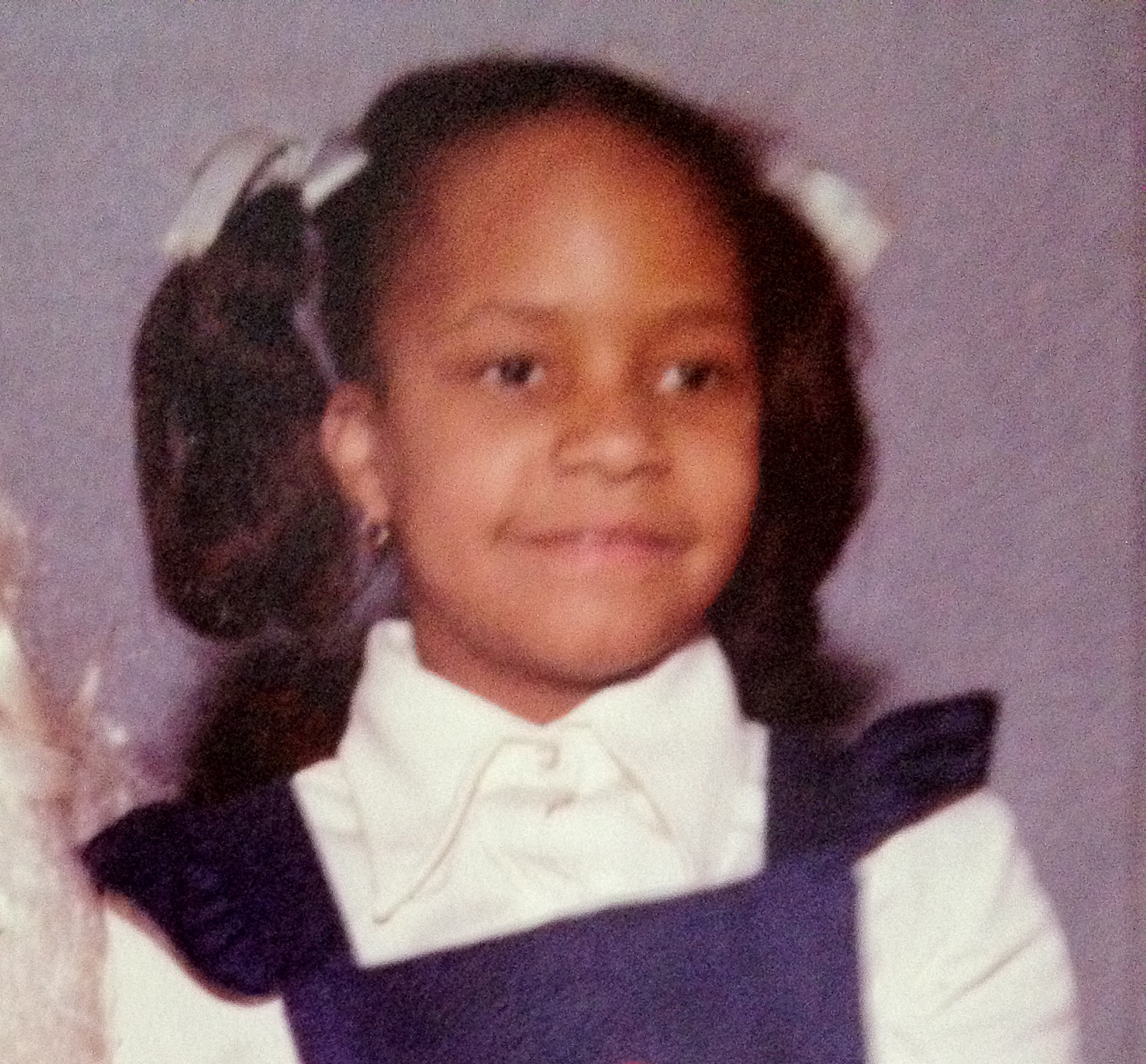Me with my natural hair at age seven. 1978 - Houston, TX.
My hair has been the ultimate lesson in patience and acceptance. Some of my earliest memories are getting my hair pressed at the kitchen table in Houston, Texas in the 1970s. As I sat and waited, Mom parted my hair and greased my scalp while a thick metal pressing comb heated up on the stove. All I wanted to do was run downstairs, get on my bike, make a beeline through the courtyard and jump into the pool. I could feel the steam radiating from the hot comb and when it touched the grease it would sizzle and smoke. Out of fear, I would jerk away. “Don’t move!” She’d say, “I don’t want to burn you.” I tried my best but being a restless six-year old made it difficult to sit still but over time I learned to be patient or I would inevitably end up with burn marks on my forehead, the tips of my ears and the nape of my neck.
Me with my hair pressed.
So — no talking. No squirming. No complaining…until she pulled the comb away. I didn’t understand why I was sitting inside on a perfectly sunny day, but I loved the way my hair felt after it was straightened. It was soft, smooth, flowing, long and touchable. I would run my fingers through it and toss it from side to side like that woman in the Breck commercial. It would never do this in its natural state. I would turn my back to the mirror and crane my neck as far as it would go and look over my shoulder to see how long it was getting. It was like magic. Straightening out the curls made it several inches longer and it tumbled all the way down my back. Even at the tender age of six, I noticed that after I got my hair pressed I felt prettier and people treated me differently. They smiled and told me how nice I looked. But the experience was short-lived. As soon as I went outside in the rain or humidity (90% was common in Houston), my silky, swinging ponytails would revert into puff balls on either side of my head. It happened so quickly, I remember thinking that my hair should have sound effects, like a cartoon, “Boing! Boing! Boing!” as every strand sprung back to its original shape.
Me and Mom at the beach. I was never a fan of water.
That’s when the hair roller coaster started for me. Losing my glamorous hairdo was deflating to say the least. Frustrated, I would go to Mom and whine, “Look at my hair!” And she would smile, reassure me and say, “It’s okay. We’ll fix it.” Thinking back, I realize that was an interesting choice of words, to “fix” my hair as though it was broken. It felt like an accurate description through because losing my long hair was the same feeling of playing with a toy that no longer worked. As a child, it was all very confusing. The effort it took to get my hair done felt like a huge sacrifice. It was stressful, time consuming and I missed an afternoon bike riding and playing with my friends. And then a few minutes in the wrong weather, poof! Gone. So from that point on, whenever possible, I avoided sprinklers, humidity and rain.
To “fix” my hair, Mom would soften and smooth it with Ultra Sheen. It was a green colored hair conditioning grease with a floral, waxy vanilla scent. She would sit on the couch with her basket of hair tools and point to the same spot on the brown-speckled carpet where I would sit in between her knees with my back up against the couch. She tugged, pulled, and twisted my hair into two tight French braids. This was different from getting my hair pressed. I wasn’t fearful of getting burned, but it was still painful. I remember my hair being pulled so tight the skin on my forehead would hurt. She would see my eyes watering and say, “I’m sorry but you’re so tender-headed.” I thought that made me extra-sensitive, maybe even special, but later I learned that everyone with excessively curly hair is “tender-headed” because it hurts to drag a comb through tightly coiled locks. Sometimes my hair was drawn so tight in order to get it as smooth as possible it was like having an instant facelift. My eyebrows were raised almost an inch closer to my hairline. After years of watching my cousins and other black friends go through the same ordeal, I got the message that we were different. Mom raised us to be color-blind but in this situation, race was undeniable. My white and Latino friends didn’t have burn marks on their ears, they didn’t smell like Ultra Sheen, and they never seemed worried about getting their hair wet. It was the first time I felt different because of my race.
Does anyone have stories to share about their hair when they were young?



